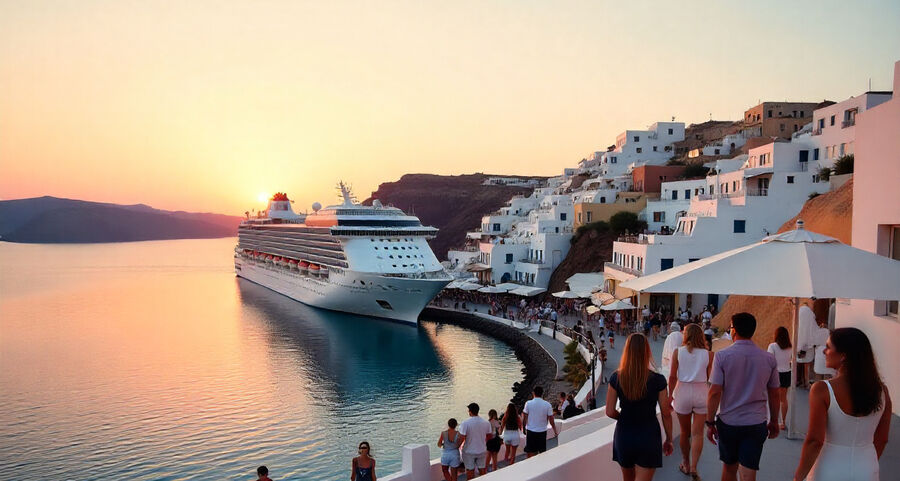≡-Greece, Italy, Indonesia, and Mexico Introduce Strong Cruise Passenger Fees to Combat Overtourism and Boost Sustainable Tourism – Viral of Today
<> Viral of Today <>
Home
»
Greece
»
Greece Travel News
»
Greece, Italy, Indonesia, and Mexico Introduce Strong Cruise Passenger Fees to Combat Overtourism and Boost Sustainable Tourism
Tuesday, July 29, 2025
Amid concerns about overtourism and the sustainability of some of the world’s most popular travel destinations, Greece, Italy, Indonesia and Mexico are among countries taking measures to protect their natural landscapes and local residents. And to combat the challenges of mass tourism and encourage a more sustainable approach to travel, these countries have implemented new cruise passenger fees. The shift is a response to overtourism, to environmental degradation, and to a desire to spread the economic benefits of tourism more widely while preserving the cultural and ecological significance of these iconic places. These destinations are leading the way in charging these strategic fees, and as a result, the policy is providing a model for the rest of the world on how to manage tourism’s growth while ensuring environmental protection – in essence, sending a clear message the world needs sustainable tourism not just as an alternative, but a necessity for the future.
Across Europe, overtourism is reaching critical levels, putting immense pressure on popular tourist destinations and their ecosystems. To combat this growing issue, several countries, including Italy, Bali, and Mexico, have already taken steps to regulate tourism. Greece is now joining these ranks by introducing new fees for cruise passengers, specifically targeting those visiting some of the most popular and heavily visited islands, including Santorini and Mykonos.
New Fees for Cruise Passengers Visiting Greece’s Most Popular Islands
Starting immediately, Greece has implemented a disembarkation fee for passengers arriving by cruise ships. Those visiting the iconic islands of Santorini and Mykonos will be charged €20 (approximately INR 2,028.48) per person. These two islands, known for their breathtaking views, blue waters, and whitewashed architecture, are among the most photographed destinations in the world. Other popular Greek islands such as Crete, Rhodes, Corfu, and Zakynthos will charge a smaller fee of €5 (INR 507.12) per passenger.
These fees will be enforced until September 30, with plans to reduce the charges in the low season. From October, as well as in April and May, the fees for Santorini and Mykonos will drop to €12 (INR 1,217.09), while passengers visiting other ports will pay €3 (INR 304.27). This adjustment is part of a broader strategy by Greek authorities to better manage the impact of seasonal overtourism, particularly during peak months when visitor numbers are highest.
Why Greece Is Taking Action
Overtourism is a growing concern in Greece, especially in light of recent statistics showing a significant increase in cruise tourism. In 2024, over 7.9 million cruise passengers visited Greece, marking a 13% rise from the previous year, according to the Hellenic Ports Association. While this influx of tourists boosts the local economy, it also places a strain on infrastructure and the environment.
For places like Santorini, where the local population is around 20,000, the impact of mass tourism has been undeniable. The island, once a serene getaway, has seen its traditional lifestyle and unique cultural heritage threatened by overcrowding. Many residents have raised concerns that the rapid influx of tourists is damaging the island’s natural beauty, particularly its delicate ecosystems and architecture. This has led to calls from local authorities and residents for greater regulation of visitor numbers.
The new disembarkation fees are part of a larger effort to curb the adverse effects of mass tourism on Greece’s most famous islands. The government aims to use these charges to encourage more sustainable tourism practices. By making it more expensive to visit these hotspots, authorities hope to limit the number of visitors, giving the environment time to recover and ensuring that local communities are not overwhelmed by the sheer volume of tourists.
Global Trend of Tourism Taxes
Greece’s decision follows a global trend in which other tourist-heavy destinations have introduced similar taxes to manage overtourism. Venice, Italy, for example, has imposed a €10 (INR 1,014.24) fee for tourists visiting the city without overnight reservations. Bali, Indonesia, has also implemented a new visitor levy to help fund sustainability projects aimed at protecting its environment. In Mexico, cruise passengers are now subject to a $5 (INR 507.12) fee, with plans to increase this charge to $21 (INR 2,129.90) by 2028.
These efforts highlight the growing global recognition that mass tourism, while beneficial to local economies, can have serious long-term environmental and social consequences. Introducing fees for tourists is seen as one way to help mitigate these impacts and preserve the cultural and natural heritage of popular destinations for future generations.
The Importance of Sustainable Tourism
As overtourism continues to be a challenge for many countries, the need for sustainable tourism practices has never been more urgent. The introduction of cruise passenger fees in Greece is part of a broader global effort to balance the economic benefits of tourism with the preservation of vulnerable ecosystems and cultural landmarks. By implementing such measures, Greece hopes to ensure that tourism can continue to contribute to the local economy without compromising the environment or the quality of life for local residents.
The introduction of these new fees is expected to spark discussions on how to create a sustainable future for tourism across the globe. As more destinations follow Greece’s lead, it is hoped that overtourism will become a challenge that can be effectively managed, ensuring that these beloved destinations remain accessible and enjoyable for travelers and locals alike.
Conclusion
The introduction of new fees for cruise passengers visiting Greece’s most popular islands is a significant step toward addressing the challenges of overtourism. As global tourism continues to grow, the implementation of similar measures in other high-traffic destinations is likely to follow. These changes signal a growing recognition that sustainable tourism practices are essential for preserving the world’s most cherished travel destinations. By introducing disembarkation fees, Greece is not only protecting its iconic islands but also paving the way for a more sustainable future in the travel industry.
This information will surprise you!
See also
- Read until the end to discover everything.
- Important information you need to know.
- Interesting facts and helpful tips.
Conclusion
Did you enjoy the news? Keep following us daily!













